Ontario Futsal Association
ONTARIO FUTSAL CUP 2015
ONTARIO CLUB CHAMPIONSHIPS
For MEN & WOMEN, BOYS & GIRLS
Futsal Ontario
Ontario Futsal Association invites you to participate in the 25th Annual tournament:
APRIL 25, 2015
at Parkside Collegiate, St. Thomas
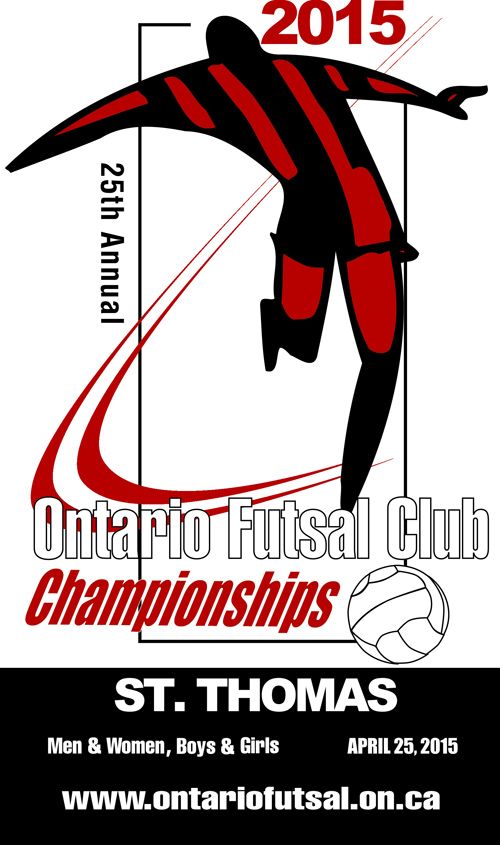
| Age Divisions |
Boys/Men |
Girls/Women |
Born on January 1, 2004 and later
|
U-11
|
U-11
|
Born on January 1, 2003 and later
|
U-12
|
U-12
|
Born on January 1, 2002 and later
|
U-13
|
U-13
|
Born on January 1, 2002 and later
|
U-14
|
U-14
|
Born on January 1, 2000 and later
|
U-15
|
U-15
|
Born on January 1, 1999 and later
|
U-16
|
U-16
|
Born on January 1, 1998 and later
|
U-17
|
U-17
|
Born on January 1, 1997 and later
|
U-18
|
U-18
|
| N/A |
OPEN |
OPEN |
Awards: For Youth teams: Team and individual awards for Champions and Finalists. For Senior teams: Team trophy and cash prizes!
Registration: Click here for our registration form and return with cheque no later than March 31, 2015.
Cost: $350.00 per Men's Team, $325 for all other teams - payable to ONTARIO FUTSAL, 71 South Valerie Street, St. Thomas, Ontario N5R 1B1.
Rules: Games will adhere to the Laws of the Game for FUTSAL.
If you have any further questions, please call Bob Luft PH: (519) 631-5852 or Fax: (519) 631-8262
e-mail: r.luft@sympatico.ca
Tournament Format: Each team is guaranteed 3 (2X15 minutes) games in group round robin play. If there is more than one group, the top team in each group will advance to the finals. If there is a single group the two top teams will advance to the finals.
Eligibility: Applications are invited from teams which are duly registered. Players must be currently registered with a team and will be required to produce approved player passes. All Star Teams shall not be accepted.
Rosters: A team may have a maximum roster of 12 players. No changes will be allowed once the team begins to play. All youth players must show proof of age before their first game.
24th Ontario Futsal Cup results
| SCHEDULE, SATURDAY, APRIL 5, 2014 |
|
|
|
|
| LOCATION: REGINA MUNDI COLLEGE: GYM |
|
|
|
|
|
|
|
|
|
|
|
|
|
|
|
|
|
|
SCORE |
SCORE |
| TIME |
GENDER |
GAME # |
|
TEAM |
|
|
|
TEAM |
| 9:00AM |
WOMEN |
1 |
|
LAC |
5 |
VS |
5 |
ACADEMY |
| 9:35AM |
WOMEN |
2 |
|
FULLHOUSES |
6 |
VS |
2 |
GANAR |
| 10:10AM |
MEN |
3 |
|
CROATIA |
4 |
VS |
4 |
SCOTS CORNER |
| 10:45AM |
MEN |
4 |
|
WALKERTON |
4 |
VS |
6 |
ACADEMY |
| 11:20AM |
WOMEN |
5 |
|
ACADEMY |
13 |
VS |
0 |
GANAR |
| 11:55AM |
WOMEN |
6 |
|
LAC |
10 |
VS |
2 |
FULLHOUSES |
| 12:30PM |
MEN |
7 |
|
SCOTS CORNER |
2 |
VS |
2 |
LAC |
| 1:05PM |
MEN |
8 |
|
CROATIA |
5 |
VS |
1 |
WALKERTON |
| 1:40PM |
WOMEN |
9 |
|
GANAR |
0 |
VS |
13 |
LAC |
| 2:15PM |
WOMEN |
10 |
|
ACADEMY |
8 |
VS |
1 |
FULLHOUSES |
| 2:50PM |
MEN |
11 |
|
LAC |
2 |
VS |
7 |
ACADEMY |
| 3:25PM |
MEN |
12 |
|
SCOTS CORNER |
6 |
VS |
2 |
WALKERTON |
| 4:00PM |
WOMEN |
13 |
|
FINAL: 1ST LAC |
3 |
VS |
8 |
2ND ACADEMY |
| 4:45PM |
MEN |
14 |
|
CROATIA |
4 |
VS |
1 |
LAC |
| 5:20PM |
MEN |
15 |
|
ACADEMY |
1 |
VS |
7 |
SCOTS CORNER |
| 5:55PM |
MEN |
16 |
|
WALKERTON |
2 |
VS |
1 |
LAC |
| 6:30PM |
MEN |
17 |
|
CROATIA |
1 |
VS |
2 |
ACADEMY |
| 7:30PM |
MEN |
18 |
|
FINAL: 1ST SCOTS CORNER |
8 |
VS |
0 |
2ND ACADEMY |
| |
|
|
|
|
|
|
|
|
| |
WOMEN'S |
FINAL |
|
LAC |
2 |
VS |
8 |
ACADEMY |
|
MEN'S |
FINAL |
|
SCOTS CORNER |
8 |
VS |
0 |
ACADEMY |
|
|
|
|
|
|
|
|
|
24th ONTARIO FUTSAL CUP
| STANDINGS |
|
|
|
|
|
|
|
|
|
|
|
|
|
|
|
|
|
|
|
| MEN'S DIVISION |
|
|
|
|
|
|
|
|
|
| TEAMS |
WIN |
LOSS |
TIE |
GF |
GA |
P |
STAND. |
TOP 3 SCORER'S |
GOALS |
| |
|
|
|
|
|
|
|
|
|
| LAC ATHLETICS |
0 |
3 |
1 |
6 |
15 |
1 |
5 |
YOVAN SAMRA |
9 |
| LONDON SCOTS CORNER |
2 |
0 |
2 |
19 |
9 |
6 |
1 |
ELVIS GIGOLLAS |
7 |
| ST. THOMAS ACADEMY |
3 |
1 |
0 |
16 |
14 |
6 |
2 |
ALONZO FLORES |
5 |
| TORONTO CROATIA |
2 |
1 |
1 |
14 |
8 |
5 |
3 |
ANTONY ARGAW |
5 |
| WALKERTON F.C. |
1 |
3 |
0 |
9 |
18 |
2 |
4 |
|
|
|
|
|
|
|
|
|
|
|
|
|
|
|
|
|
|
|
|
|
|
| WOMEN'S DIVISION |
|
|
|
|
|
|
|
|
|
| TEAMS |
WIN |
LOSS |
TIE |
GF |
GA |
P |
STAND. |
TOP 3 SCORER'S |
GOALS |
| |
|
|
|
|
|
|
|
|
|
| LONDON GANAR |
0 |
3 |
0 |
2 |
32 |
0 |
4 |
AMANDA DAFOE |
8 |
| LAC ATHLETICS |
2 |
0 |
1 |
26 |
6 |
5 |
2 |
CLAIRE MONYARD |
8 |
| ST, THOMAS ACADEMY |
2 |
0 |
1 |
28 |
7 |
5 |
1 |
MACKENZIE EDGE |
8 |
| ST. THOMAS FULLHOUSES |
1 |
2 |
0 |
9 |
20 |
2 |
3 |
|
|
St Thomas Academy Women Team
Won the Championship at the Ontario Futsal Cup Tournament which was held at Regina Mundi College on Saturday, April 6, 2024. "This is the second year in row that the St Thomas have been Women Division Champions " said coach Joe Filipovic.St Thomas Academy defeated of London 7-2 in Final.
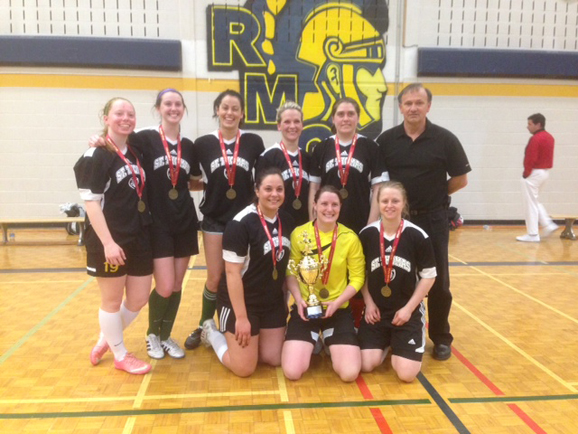
Front row Marlina Filipovic, Jacquie Baker, Nicki Brown,
Back row Haley Summers, Amanda Dafoe, Nicole Devries, Karen Lewis, Nikki Vanderwallen. Coach Joe Filipovic
Futsal, not beach football, is the key to Brazil's style
Posted by Fernando Duarte
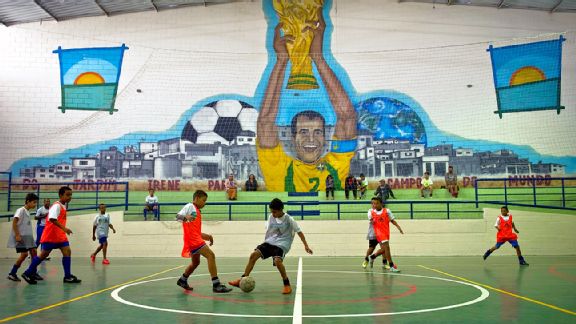
Nelson Almeida/AFP/Getty Images
The futsal movement is strong in Brazil. Here, kids play at the Cafu Foundation in Rio de Janeiro.
Ronaldo was probably 10 when he properly stepped on a beach. Born and bred in Bento Ribeiro, a poor neighborhood in the outskirts of Rio de Janeiro, he had spent more time grazing his toes on concrete or grass-less pitches than actually stepping on sand -- he would later almost drown in an over-enthusiastic attempt to tame the waves at the renowned Copacabana Beach. For him and his family to regularly check the seaside scene they would have to endure grueling bus journeys.
Pele? He was born in Tres Coracoes, a small landlocked town in the even more landlocked state of Minas Gerais, and grew up in Bauru, also as far from the Sao Paulo coastline as one could imagine. Two of the greatest Brazilian footballers never honed their skills on the beach, contrary to what you will read and hear a lot of people around the world say.
In fact, Ronaldo and Pele have in common some time spent chasing and kicking a smaller and heavier ball. Both played futsal at a certain point of their formative years. So did other legends, such as Zico, Rivelino and Romario.
The latter would become famous a few years down the line for his love of foot-volley games by the sea, but the image of Brazilian players running freely on sand is almost as naïve as it is romantic. If you want to find secrets underpinning the unique talents of Brazilian footballers, it's indoors you should head.
Futsal, the abbreviation for Futebol de Salão (indoor football in Portuguese) is more linked to Brazil than its bigger cousin. While historians still debate the origins of the game, arguably created in Uruguay in the 1930s, it was in 1940s Brazil that Futsal spread as answer to availability and assorted logistical difficulties surrounding the use of football pitches.
A group of regulars the YMCA chapter in Sao Paulo decided to use a basketball court for a kick-about. The reduced space, though, made it difficult to play with a regular football and so a heavier version was developed for the new game, which these days boasts around 11 million players in Brazil -- more than basketball.
Gravity did more than just keep the ball lower to the ground -- it nudged futsal players into working hard into their skills. With space confined to courts that can measure a maximum 40x20 meters and the stifling presence of eight outfield players, short dribbling and ball control became the last bottle of Coke in a journey through the desert.

Getty Images
Many Selecao legends, including Rivelino, honed their close control in futsal.
Albeit the radical change in conditions from court to pitch, those skills can still come in pretty handy. Let's use Rivelino as an example -- it was in futsal that he developed his fearsome "elastico" (rubber band) dribble, which would later be used bya certain Ronaldinho in Barcelona. The same Ronaldinho whose footage killing the opposition in a futsal court as a kid once featured in a Nike advert.
It didn't take long for futsal to take off, but formal organization would not follow the same quick pace of a futsal match. The international ruling body (FIFUSA) was only founded in 1971 and the first proper World Championship would only take place in 1982. No need to guess who won it, although Brazil only beat Paraguay by a single goal in the final, played in Sao Paulo.
Three years later, in Spain, Brazil did again before, losing to Spain, Brazil did again before, losing to Paraguay in 1988 before winning the next three tournaments at a time things were definitely not doing so well on grass pitches -- you might remember what felt like an eternity between Pele's triumph in Mexico 1970 and Romario's heroics at USA '94.
Sooner than later, though, competition would develop. And just like in regular football Spain came on knocking, developing a strong national league and later poaching Brazilian-born players to reinforce their team.
"Converted" Spaniards scored the winning goals in the 2000 and 2004 finals -- in 2000, against Brazil. "I would love to see Spain winning a World Cup without the help of one of us," taunted Brazilian captain Vinicius ahead of the 2012 tournament. They didn't, as Vinicius and Brazil successfully defended the title they had taken back from the Spaniards four years before.
In England, the game hasn't taken off at top level but is proliferating at the grassroots level, where you can find an intriguing venture: The Brazilian Soccer schools, a network of training centers set up by former PE teacher Simon Clifford, a loyal Middlesbrough fan who in the mid-nineties asked Brazilian mercurial midfielder Juninho about the secrets of his skills. "Futsal," answered the pint-sized genius.
For over ten years Clifford has preached about the benefits of futsal for the development of skills, but it was only after one of his graduates, Micah Richards, started playing for Manchester City that England started listening. Clifford even got into Southampton FC to try to put his methods in practice in 2005 but departed after just a couple of months -- the old guard at the club didn't take lightly his criticism over the traditional methods employed by Harry Redknapp's coaching staff.
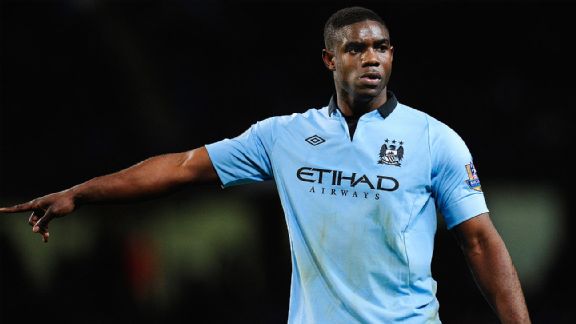
Stu Forster/Getty Images
Micah Richards played futsal growing up to improve his technique.
"Futsal can represent a game-changer for England's footballers of the future and we have proven so. These great Brazilian players should be evidence enough of the impact it can have for players who develop their skills this way at the earlier stages," Clifford explains.
Differently from the grass game, where Brazil and Spain have only met twice in the past 14 years, the two nations' futsal rivalry is fierce and few doubt the two countries will square up in the final in Colombia 2016.
Two-sided as it seems, however, the game is by no means confined to Madrid and Rio. The game is played in over 100 countries worldwide by more than 12 million people according to FIFA, who took over control of the game in 1990 and also brought new rules to the game in order to make it more TV friendly: thrown-ins would be taken with feet, goalkeepers woul be allowed to leave their area to function as sweepers and, most of all, goals could be scored inside the box.
The ball also changed to a slightly lighter and bigger version -- 440 grams and 64cm compared to 500g and 62cm previously -- but significant enough to allow more speed in play and also more trickery. Ah, it also made Futsal the official name. "Futsal became much more dynamic and creative. It certainly became more attractive to the audiences and brought more kids to play it," explains former Selecao player Manoel Tobias.
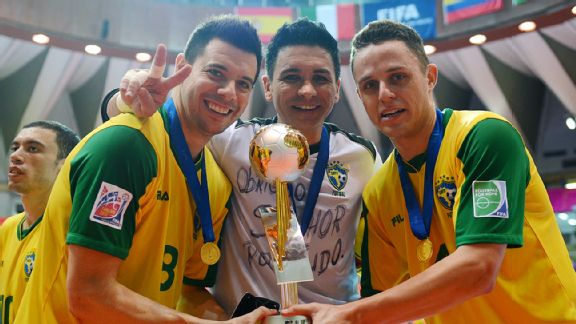
Lars Baron/Getty Images
Brazil's success in futsal is unprecedented. So too is its influence in the regular version of the game and Brazil's overarching style.
If the name doesn't ring a bell, it certainly provokes gasps among futsal lovers. Tobias is considered the game's answer to Pele, winning countless trophies including back-to-back Golden Boots in the 1996 and 2000 Futsal World Cups. Nobody in Brazil has even got close to the 52 goals he scored in the 1999 Brazilian Championship.
Unfortunately, the 43-year-old is also an example of how things can go wrong with the transition. What unites successful cases like Zico's is that they moved to football early, while Tobias attempted a leap of faith in 1996, at 24, signing with Southern Brazilian side Gremio -- curiously managed at the time by Luiz Felipe Scolari.
The much-publicized move lasted only four months, after Tobias realized he lacked the necessary stamina. "Nobody would be able to take the ball from me but when it was time to sprint 40m to get close to the goal things became quite difficult. But you can't do the opposite either. Neymar, for example, would struggle if he got back to futsal because that would mean moving much more frequently back and forth and operation in a much smaller space than what he's now used to," says Tobias.
If you are still not convinced, read the following quote from aFIFA World Magazine interview on futsal published in November 2012. "During my childhood all we played was futsal. The small playing area helped me improve my close control and whenever I played futsal I felt free. If it wasn't for futsal I would not be the player I am today." Who said it? Cristiano Ronaldo. |



